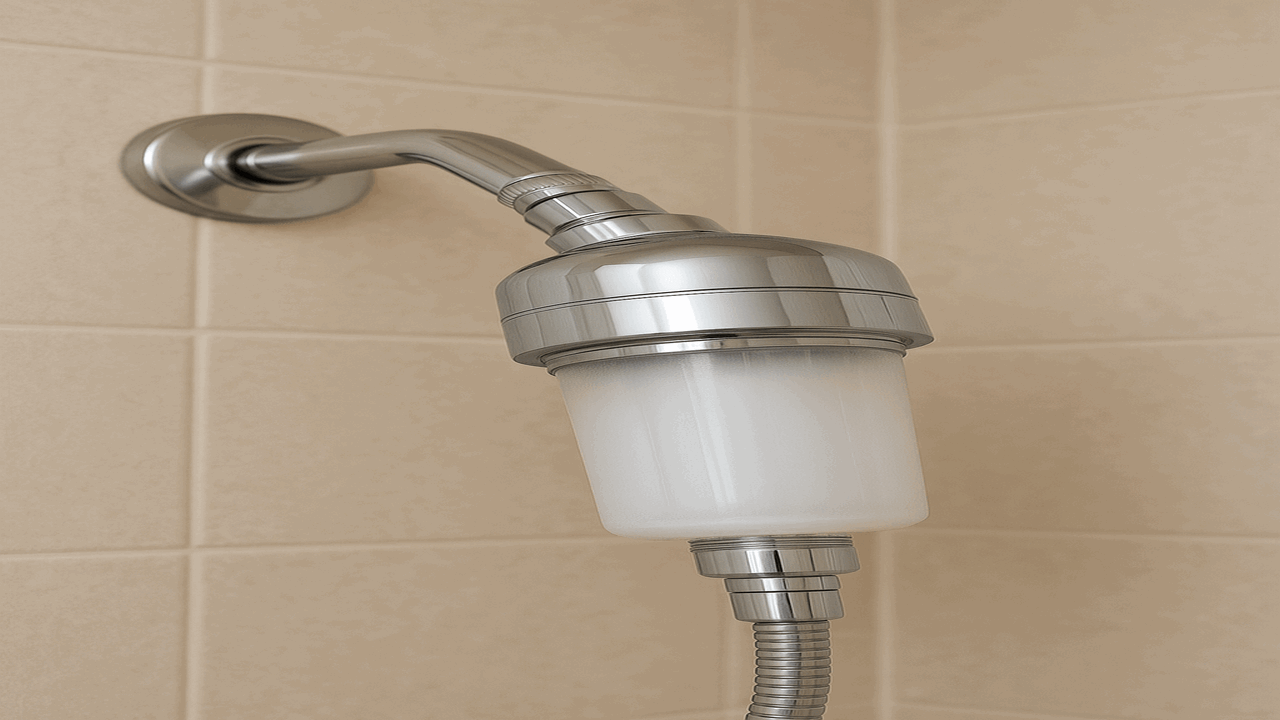Shower Head Water Filter, what are they?
A shower filter is equipment that can be attached to your showerhead or hose to clean your system of excess metals, chemicals and other contaminants. It is like a mini water purification system, in your shower.

How It Works
Common filters work with filters like activated carbon, KDF (Kinetic Degradation Fluxion) or Vitamin C. These materials aid in trapping chlorine, heavy metals such as lead and mercury and bacteria and even fluoride at times.
Common Types of Shower Filters
- In-line filters: these are applied between shower-arm and shower-head.
- Shower head filters: They are in-line built into the shower head.
- Hand Held filters: they are linked to handheld shower wands.
- Multi-partite filters: Eliminate a quantity of the contaminants since they are an arrangement of layers.
Why You Need a Shower Filter
What exactly comes out from Your Faucet?
Tap water usually contains clotrim, chloramines, lead, chemical pesticides and microplastics. While generally safe to drink in most cities, having a daily shower in this water can damage the skin and lungs as your skin and lungs absorb these chemicals.
Who ought to use one?
- Those with sensitive skin type
- Patients who have mundane skin disorders that are not most likely eczema or psoriaisis
- Those of us who residents in a region that experiences hard water
Benefits of Using a Shower Filter
Health Benefits
When you get rid of chlorine and other chemicals, you will be exposed to fewer respiratory irritants and potential carcinogens. An example of the gas that vaporizes in hot showers is chlorine, which we may breathe.
Skin and Hair Improvements
To get healthier skin and hair, eliminate the drying influence of unfiltered water.Shower filters allow your skin to maintain its pH and make the hair smooth and shiny.
Reduction of Hard Water Effects
Hard water causes your scalp and skin to have mineral deposits. This is reduced with the aid of a shower filter, which eliminates the growth of dandruff, sensitivities and blocked pores.
Potential Drawbacks and Limitations
Not All Filters Are Made Equal
Poor or low budget filters might take little or nothing. Others are deficient of heavy metals or chloramines as they happen to attack chlorine only.
Maintenance and Replacement Costs
Replacing a filter cartridge will have to be done in a couple of months. That totals. Moreover, a bad filter maintenance may cause it to become a bacteria colony.
When and How Often to Replace a Shower Filter
Signs Your Filter Needs Replacing
- Lost water pressure
- Alteration of odour or colour
- Skin cutis or hair scalp feels weird/uneven again.
- Mold or residue is evident
General Replacement Timeline
The normal filter should last 10,000 gallons or 2-6 months, depending on the first limit its reached.Check manufacturer specifications of your specific model.
Know What You’re Filtering Out
Does chlorine bug you? Or is it hard water, rust or sulfur smell? Picking the appropriate shower filter will be determined by the type of contaminants in your local supply.
Match It to Your Water Type
In the case of hard water, you can seek a KDF or a ceramic bead based filter. Chloramine-heavy water is more efficiently ‘run off with Vitamin C filters rather than carbon.
Consider Compatibility and Installation
Bargain the filter to your certain composition (wall-mount, handheld, or mix). The majority of them are universal ones, however, it is safer to check.
Certifications and Testing
Use NSF-certified filters or independently tested filters.This is to be sure that you are not getting a product that fails to deliver what it promises.
DIY vs. Professional Installation
When DIY Works Just Fine
Shower filters are generally simple to install and installation comes with step by step instructions. In case you feel confident working with a wrench and Teflon tape you have nothing to worry about.
When to Call in the Pros
In case your plumbing is old or you are changing all plumbing in your bathroom, then it could be worthwhile to hire a plumber so that the sealing and flow rate is adequate.
Best Practices for Maximizing Filter Performance
Maintenance Tips
- Clean showerhead on a regular basis
- Clean the filter, once a month with hot water
- Monitor the changes in pressure
Storage and Handling
When you are not going to use the shower a long time (you go on vacation, etc.), remove the filter and turn it somewhere dry to exclude the bacteria development.
Top Brands and Product Recommendations (2025 Update)
- AquaBliss High Output Revitalising Filter
Having the advantages of using it in softening hard water and restoring natural shine to your hair. - Culligan WSH-C125
NSF certified and cost effective. - Berkey Inline Shower Filter
Eliminates chlorine and heavy metals. - Vita Fresh Vitamin C Filter
Most suited to chloramine rich water users. - Sprite HO2-WH-M Filter universal
Multi-stage option that is popular and with replaceable cartridges.
Final Thoughts
Shower filters could be considered a minor add-on, but can have a tremendous effect- when it comes to hard water, itchy-skin, and lame-looking hair. It is an intelligent and inexpensive idea to give your showering experience an upgrade by investing in a decent shower filter whether you are health-conscious or merely wish to acquire sensitive skin or skin type.
All you need to do is choose the appropriate one according to your type of water and maintain it and change it in time. Your plumbing, as well as your body, will appreciate it.
FAQs
Mayank Rawat
Certified Skincare Consultant and passionate researcher, I specialize in exploring skincare ingredients and haircare actives. Always eager to stay ahead of trends, I continuously update my knowledge to bring science-backed solutions. Dedicated to helping others achieve healthy skin and hair through expertise and innovation.